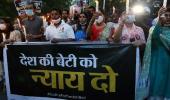The Delhi high court on Wednesday delivered a split verdict with one of the judges favouring striking down the provision, and the other holding it was not unconstitutional.
Here are observations of the judges.

Sexual assault by husband needs to be called rape: Justice Shakdher
While striking down the marital rape exception in the Indian Penal Code, Justice Rajiv Shakdher of Delhi high court on Wednesday said that the immunity to the husband is “steeped in patriarchy and misogyny” and sexual assault by the husband on his wife needs to be called out as rape and non-consensual sex in a marriage is an antithesis of what matrimony stands for in modern times i.e. the relationship of equals.
Justice Shakdher, who headed the division bench which delivered the split verdict on the issue of criminalisation of marital rape, stated that legitimate conjugal expectations cannot be put at par with the husband enjoying “unbridled access and/or marital privilege” and a married woman's right to bring the offending husband to justice needs to be recognized.
“Rape, as an offence, deserves societal disapprobation in the strongest terms, notwithstanding, the fact that the rapist is in a marital relationship with the victim,” he said in his 193-page judgement.
The judge asserted when the object of Section 375 (rape) is to punish offenders, the classification between married and unmarried couples in the context of forced sex is “unequal”, “manifestly unjust” as well as “oppressive” and that to keep away the law even when a woman is subjected to forced sex by her husband by drawing a distinction between “private and public space”, is to deny her the agency and autonomy that the Constitution confers on her.
He opined that the present rape law is “completely skewed insofar as married women are concerned” and to say that the law provides an aggrieved married woman “other remedies” is “no answer”.
“The State appears to have stopped short of conferring the right on a woman to call out an offender who happens to be her husband when he subjects her to rape... Sexual assault by the husband on his wife which falls within the fold of Section 375 of the IPC, in my opinion, needs to be called out as rape as that is one of the ways in which the society expresses its disapproval concerning the conduct of the offender. Oddly, the prevailing mores in society appear to stigmatize the victim rather than the rapist,” Justice Shakdher said.
“Modern-day marriage is a relationship of equals. The woman by entering into matrimony does not subjugate or subordinate herself to her spouse or give irrevocable consent to sexual intercourse in all circumstances. Consensual sex is at the heart of a healthy and joyful marital relationship. Non-consensual sex in marriage is an antithesis of what matrimony stands for in modern times i.e., the relationship of equals,” he added.
Justice Shakdher also noted that he did not advert to the submissions of the Central Government or the Delhi government as while the former did not “take a stand” in the matter, the latter withdrew its submissions subsequently.
“A married woman's right to bring the offending husband to justice needs to be recognized. This door needs to be unlocked; the rest can follow. As a society, we have remained somnolent for far too long. Deifying women has no meaning if they are not empowered. They are our equal half; some would delightfully say our better half. It is time that all stakeholders bite the bullet,” he said.
The judge also considered the history of the marital rape exception, saying that “a plain reading of which will disclose that it is steeped in patriarchy and misogyny”.
“In fact, I would go further and say that MRE (marital rape exception) has contributed to diminishing the freedom won by human beings from slavery and the struggle that they experienced in removing discrimination on account of colour, creed, ethnicity, and sex,” he added.
The judge, while holding that the exception was violative of Articles 14(Equality before law), 15 (prohibition of discrimination on grounds of religion, race, caste, sex, or place of birth), 19(1) (A) (right to freedom of speech and expression) and 21 (right to life and personal liberty) of the Constitution, also rejected the contention that a solution can to found after the Executive's “consultative process culminates in a legislative intervention” and said "shunning responsibility" and leaving it to the Executive and the Legislature would constitute abandonment of the duty and the role which the Constitution has defined for the courts.
He also turned down the apprehensions concerning the filing of false cases against husbands, saying that the argument is “completely unmerited” and “lodgement of false cases is not confined to rape”.
“To my mind, self-assured and good men have nothing to fear if this change is sustained. If I were to hazard a guess, those amongst us who want the status quo to continue would perhaps want to have the MRE struck down if the victim involved was his/her mother, sister, or daughter,” said the judge who also dismissed contentions that marital rape would be difficult to prove and that striking down the exception would create a new offence.
“The argument that the State has recognized other forms of sexual offences and, therefore, to protect the familial structure, it does not wish to go further (i.e., empower a married woman to trigger the criminal law when her husband subjects her to rape) amounts to giving recognition to the abominable Common Law Doctrine that a married woman is nothing but chattel who loses her sexual agency once she enters matrimony,”
Sexual autonomy of women non-compromisable, says Justice C Hari Shankar
Sexual autonomy of women is “non-compromisable” and females are equal to men in every way that matters, Justice C Hari Shankar of the Delhi high court said.
However, the judge refused to hold as unconstitutional the exception in law which grants protection to husbands from being prosecuted for non-consensual sexual intercourse with their wives.
Justice Shankar said that provisions in the penal law that compromise on woman's right to freedom of sexual choice, either regarding the person with whom or when to have sex, or that prohibit a person from prosecuting an offender for having committed a statutory offence, or that violate any of the fundamental rights would necessarily be unconstitutional.
“The impugned exception, however, does none of these things, though counsel for the petitioners, who seek to have the provision done away with, would emphatically urge to the contrary,” he said in his 200-page judgement.
The issue of criminalisation of marital rape witnessed a split verdict from a division bench of the high court with Justice Rajiv Shakdher favouring striking down the exception in law which grants protection to husbands from being prosecuted for non-consensual sexual intercourse with their wives, Justice Shankar refused to hold it as unconstitutional.
However, both the judges on the bench concurred with each other for granting the certificate of leave to appeal to the Supreme Court in the matter as it involves substantial questions of law that requires a decision from the top court.
While Justice Shakdher, who headed the bench, favoured striking down the marital rape exception and said it would be tragic if a married woman's call for justice is not heard even after 162 years since the enactment of the Indian Penal Code, Justice Shankar said the exception under the rape law is not unconstitutional and was based on an intelligible differentia having a rational nexus with the object of the exception as well as section 375 (offence of rape) of the Indian Penal Code (IPC) itself.
The petitioners had challenged the constitutionality of the marital rape exception under section 375 of the IPC on the ground that it discriminated against married women who are sexually assaulted by their husbands.
Under the exception given in section 375 of the IPC, sexual intercourse or sexual acts by a man with his wife, the wife not being minor, is not rape.
In his verdict, Justice Shankar said, “Just as every incident of taking of the life by one, of another, is not murder, every incident of non-consensual sex of a man with a woman is not rape, howsoever much counsel for the petitioners might want it to be.”
“The foundation of the petitioners' case is, therefore, with all due respect to counsel, fundamentally flimsy. A castle cannot be built on reeds,” he said.
He said as most of the submissions proceeded on the premise that any and every act of sex by a man with a woman against her will is necessarily rape, irrespective of the circumstances in which they were situated and the relationship between them, the main issue of whether the exception is unconstitutional, was “lost in the clamour.”
“The question of whether the unique demographics of marriage, which unquestionably extend to the sexual sphere as well, would, or would not, justify a differential treatment being extended to sexual acts within marriage, even if non-consensual, was not, I am constrained to observe, debated with the seriousness it deserves,” he said.
Justice Shankar said that women are morally, legally, spiritually, and in every other way that matters, equal to men.
“Sexual autonomy of women is non-compromisable,” he said, adding, “The chance chromosomal circumstance that makes one a man and the other woman has, with the passage of time, ceased to have any significance worth the name. “
He said the court has only to decide whether, in excepting from the sphere of marriage any allegation of rape, the legislature has acted unconstitutionally.
“To urge that rape, per definition, is non-consensual sex by a man with a woman, is just as simplistic as the contention that murder, per definition, is the taking of the life of one man by another,” Justice Shankar said.
He said the challenge to the provisions by the petitioners cannot sustain.
Justice Shakdher, in his 193-page separate judgement, regretted that he was not able to persuade Justice Shankar to his point of view and said “he, perhaps, hears a beat of a different drummer. I respect that.”
The court's verdict came on PILs filed by NGOs RIT Foundation, All India Democratic Women's Association, a man and a woman seeking striking down of the exception granted to husbands under the Indian rape law.
In its 2017 affidavit, the Centre had opposed the pleas, saying that marital rape cannot be made a criminal offence as it could become a phenomenon that may destabilise the institution of marriage and an easy tool for harassing husbands.
However, the Centre told the court in January that it was "re-looking" at its earlier stand on the petitions as that was brought on record in the affidavit filed several years ago.
In February, the Centre urged the court to grant more time to enable it to state its stand on the issue after a consultative process, but the prayer was turned down.
NGO, Men Welfare Trust had argued that sexual intercourse between a husband and wife cannot be treated at par with that in non-marital relationships as the issue of consent cannot be divorced from the context of a marriage.










